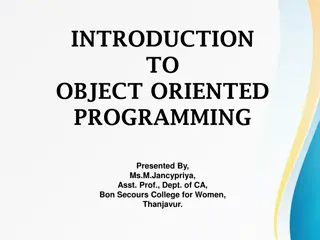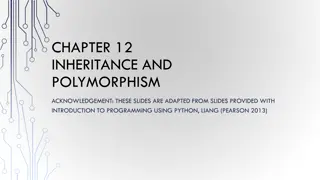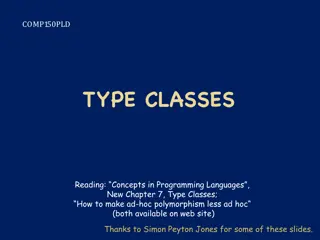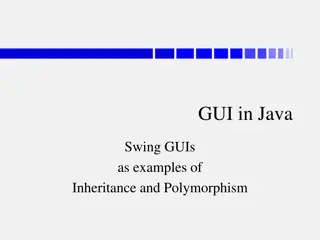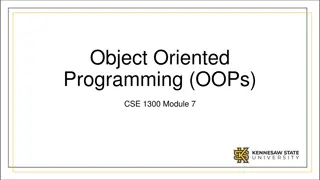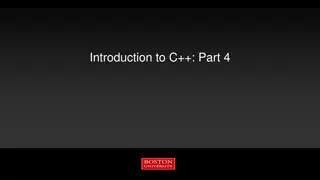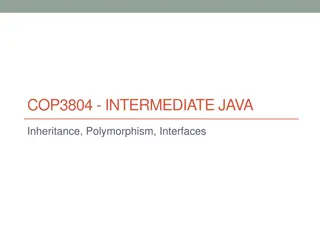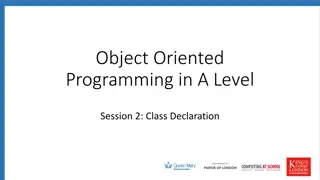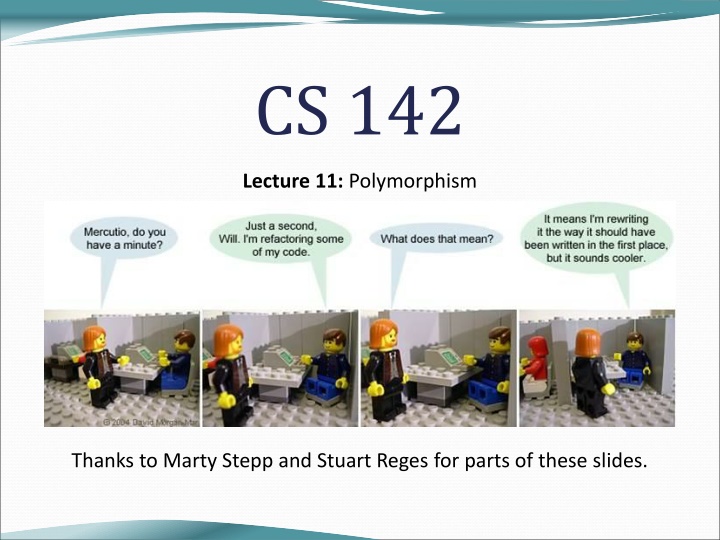
Polymorphism in Java
Polymorphism in Java allows the same code to be used with different types of objects, enabling them to behave differently. This concept is illustrated through examples such as coding with polymorphism, passing subtypes of parameters, and utilizing arrays of superclass types. With polymorphism, variables of a superclass type can hold objects of any subclass, and methods can be called based on the actual object type. The ability to store any subtype as elements in arrays and deciphering the output from different methods in the context of polymorphism are also discussed.
Download Presentation

Please find below an Image/Link to download the presentation.
The content on the website is provided AS IS for your information and personal use only. It may not be sold, licensed, or shared on other websites without obtaining consent from the author. If you encounter any issues during the download, it is possible that the publisher has removed the file from their server.
You are allowed to download the files provided on this website for personal or commercial use, subject to the condition that they are used lawfully. All files are the property of their respective owners.
The content on the website is provided AS IS for your information and personal use only. It may not be sold, licensed, or shared on other websites without obtaining consent from the author.
E N D
Presentation Transcript
CS 142 Lecture 11: Polymorphism Thanks to Marty Stepp and Stuart Reges for parts of these slides.
Polymorphism polymorphism: Ability for the same code to be used with different types of objects and behave differently with each. System.out.println can print any type of object. Each one displays in its own way on the console. CritterMain can interact with any type of critter. Each one moves, fights, etc. in its own way. 2
Coding with polymorphism A variable of type T can hold an object of any subclass of T. Employee ed = new Lawyer(); You can call any methods from the Employee class on ed. When a method is called on ed, it behaves as a Lawyer. System.out.println(ed.getSalary()); // 50000.0 System.out.println(ed.getVacationForm()); // pink 3
Polymorphism and parameters You can pass any subtype of a parameter's type. public class EmployeeMain { public static void main(String[] args) { Lawyer lisa = new Lawyer(); Secretary steve = new Secretary(); printInfo(lisa); printInfo(steve); } public static void printInfo(Employee empl) { System.out.println("salary: " + empl.getSalary()); System.out.println("v.days: " + empl.getVacationDays()); System.out.println("v.form: " + empl.getVacationForm()); System.out.println(); } } OUTPUT: salary: 50000.0 v.days: 15 v.form: pink salary: 50000.0 v.days: 10 v.form: yellow 4
Polymorphism and arrays Arrays of superclass types can store any subtype as elements. public class EmployeeMain2 { public static void main(String[] args) { Employee[] e = { new Lawyer(), new Secretary(), new Marketer(), new LegalSecretary() }; for (int i = 0; i < e.length; i++) { System.out.println("salary: " + e[i].getSalary()); System.out.println("v.days: " + e[i].getVacationDays()); System.out.println(); } } } Output: salary: 50000.0 v.days: 15 salary: 50000.0 v.days: 10 salary: 60000.0 v.days: 10 salary: 55000.0 v.days: 10 5
"Polymorphism mystery" Figure out the output from all methods of these classes: public class Snow { public void method2() { System.out.println("Snow 2"); } public void method3() { System.out.println("Snow 3"); } } public class Rain extends Snow { public void method1() { System.out.println("Rain 1"); } public void method2() { System.out.println("Rain 2"); } } 6
"Polymorphism mystery" public class Sleet extends Snow { public void method2() { System.out.println("Sleet 2"); super.method2(); method3(); } public void method3() { System.out.println("Sleet 3"); } } public class Fog extends Sleet { public void method1() { System.out.println("Fog 1"); } public void method3() { System.out.println("Fog 3"); } } 7
Technique 1: diagram Diagram the classes from top (superclass) to bottom. Snow method2 method3 Rain Sleet method1 method2 (method3) method2 method3 Fog method1 (method2) method3 8
Technique 2: table method method1 method1 method Snow Snow Rain Rain Sleet Sleet Fog Fog Rain 1 Fog 1 method2 method2 Snow 2 Rain 2 Sleet 2 Snow 2 method3() Sleet 3 Sleet 2 Snow 2 method3() Fog 3 method3 method3 Snow 3 Snow 3 Italic - inherited behavior Bold - dynamic method call 9
Mystery problem, no cast Snow var3 = new Rain(); var3.method2(); // What's the output? If the problem does not have any casting, then: 1. Look at the variable's type. If that type does not have the method: ERROR. Execute the method, behaving like the object's type. (The variable type no longer matters in this step.) 2. 10
Example 1 What is the output of the following call? variable Snow var1 = new Sleet(); var1.method2(); Snow method2 method3 Answer: object Rain Sleet Sleet 2 Snow 2 Sleet 3 method1 method2 (method3) method2 method3 Fog method1 (method2) method3 11
Example 2 What is the output of the following call? variable Snow var2 = new Rain(); var2.method1(); Snow method2 method3 Answer: object Rain Sleet ERROR (because Snow does not have a method1) method1 method2 (method3) method2 method3 Fog method1 (method2) method3 12
Mystery problem with cast Snow var2 = new Rain(); ((Sleet) var2).method2(); // What's the output? If the problem does have a type cast, then: 1. Look at the cast type. If that type does not have the method: ERROR. Make sure the object's type is the cast type or is a subclass of the cast type. If not: ERROR. (No sideways casts!) 2. Execute the method, behaving like the object's type. (The variable / cast types no longer matter in this step.) 3. 13
Example 3 What is the output of the following call? variable Snow var2 = new Rain(); ((Rain) var2).method1(); Snow method2 method3 cast Answer: object Rain Sleet Rain 1 method1 method2 (method3) method2 method3 Fog method1 (method2) method3 14
Example 4 What is the output of the following call? variable Snow var2 = new Rain(); ((Sleet) var2).method2(); Snow method2 method3 Answer: object cast Rain Sleet ERROR (because the object's type, Rain, cannot be cast into Sleet) method1 method2 (method3) method2 method3 Fog method1 (method2) method3 15
Casting references A variable can only call that type's methods, not a subtype's. Employee ed = new Lawyer(); int hours = ed.getHours(); // ok; this is in Employee ed.sue();// compiler error The compiler's reasoning is, variable ed could store any kind of employee, and not all kinds know how to sue . To use Lawyer methods on ed, we can type-cast it. Lawyer theRealEd = (Lawyer) ed; theRealEd.sue(); // ok ((Lawyer) ed).sue(); // shorter version 16
More about casting The code crashes if you cast an object too far down the tree. Employee eric = new Secretary(); ((Secretary) eric).takeDictation("hi"); // ok ((LegalSecretary) eric).fileLegalBriefs();// exception // (Secretary object doesn't know how to file briefs) You can cast only up and down the tree, not sideways. Lawyer linda = new Lawyer(); ((Secretary) linda).takeDictation("hi");// error Casting doesn't actually change the object's behavior. It just gets the code to compile/run. ((Employee) linda).getVacationForm() // pink (Lawyer's) 17
Exercise: BankAccount How can we make sure that every bank account gets a unique id? public class BankAccount { private String name; private int id; public BankAccount(int accountNumber) { id = accountNumber; // give number to account } ... public int getID() { // return this account's id return id; } } 18
Static members static: Part of a class, rather than part of an object. Object classes can have static methods and fields. Not copied into each object; shared by all objects of that class. class state: private static int staticFieldA private static String staticFieldB behavior: public static void someStaticMethodC() public static void someStaticMethodD() object #1 object #2 object #3 state: int field2 double field2 behavior: public void method3() public int method4() public void method5() state: int field1 double field2 behavior: public void method3() public int method4() public void method5() state: int field1 double field2 behavior: public void method3() public int method4() public void method5() 19
Static fields private static typename; or, private static typename = value; Example: private static int theAnswer = 42; static field: Stored in the class instead of each object. A "shared" global field that all objects can access and modify. Like a class constant, except that its value can be changed. 20
Accessing static fields From inside the class where the field was declared: fieldName // get the value fieldName = value; // set the value From another class (if the field is public): ClassName.fieldName // get the value ClassName.fieldName = value; // set the value generally static fields are not public unless they are final Exercise: Write the working version of Giraffe. 21
BankAccount solution public class BankAccount { // static count of how many accounts are created // (only one count shared for the whole class) private static int objectCount = 0; // fields (replicated for each object) private String name; private int id; public BankAccount() { objectCount++; // advance the id, and id = objectCount; // give number to account } ... public int getID() { // return this account's id return id; } } 22
Static methods // the same syntax you've already used for methods public static typename(parameters) { statements; } static method: Stored in a class, not in an object. Shared by all objects of the class, not replicated. Does not have any implicit parameter, this; therefore, cannot access any particular object's fields. Exercise: Make it so that clients can find out how many total BankAccount objects have ever been created. 23
BankAccount solution public class BankAccount { // static count of how many accounts are created // (only one count shared for the whole class) private static int objectCount = 0; // clients can call this to find out # accounts created public static int getNumAccounts() { return objectCount; } // fields (replicated for each object) private String name; private int id; public BankAccount() { objectCount++; // advance the id, and id = objectCount; // give number to account } ... public int getID() { // return this account's id return id; } } 24





